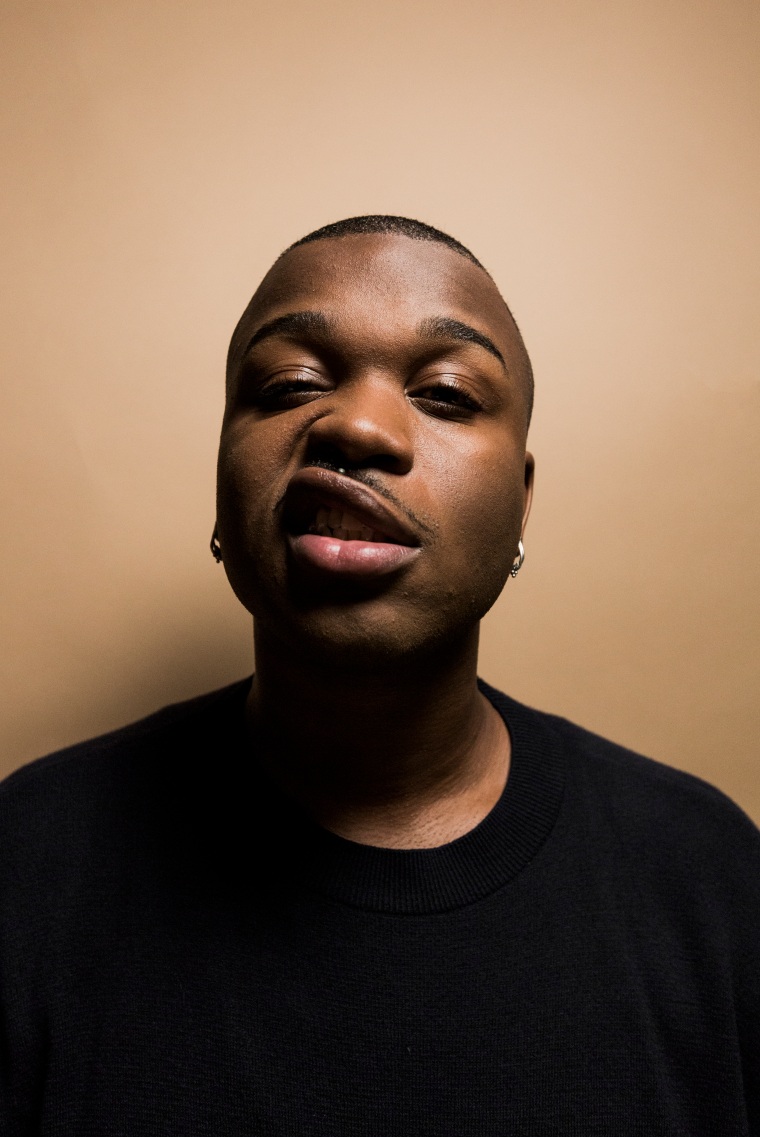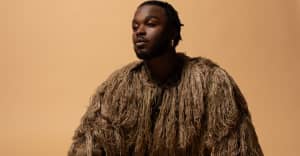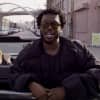
Cakes Da Killa has always had to do a lot of things at once. As an MC from New Jersey, he's tried to honor local sounds and history, while adding in strong dashes of his queerness and dance sensibilities. On mixtapes like The Eulogy, Hunger Pangs, and #IMF, Cakes made a mark for himself in several lanes, sometimes to spectacular results.
In the years since his first releases, he's matured and gained acceptance in multiple spheres. On his debut LP Hedonism, out today, Cakes effectively straddles multiple worlds at once: there are basement rap tracks, dance cuts that would fit in at Pride festivals around the world, as well as songs you can just vibe to. Peaches and Rye Rye pop up for club-ready features and, just before the album ends, there's a clip of Hot 97's Ebro Darden and Peter Rosenberg giving him a nod of approval.
At The FADER office on a recent afternoon, Cakes explained the overall intent of the project. "The album is kind of like a jelly bean bag of assorted things that represent me," he said. "But I always try to make sure that I appease a lot of people because my fan base is so weird."
In a wide-ranging conversation, he addressed some criticism he's gotten for his mainstream success, how he's grown as a businessperson, and why you'll never really hear him sing on a track.
I wanna start off by asking about the intro. You say that you were "sinking" and "drowning." Where were you mentally while recording this album?
I was in a relationship but the album is not just about a relationship, even though it may seem like I have an Adele-y moment. It was just about the relationship and me dealing with my career and feeling like I wasn't being appreciated. I was putting so much work into my music and into my live shows and into my hustle because I don't have another job. This is all I do and I felt like I was still kind of being treated as this obscure thing. So, I was getting frustrated with that. I was sick of it; I was just over it. But I have nothing else to do because it's the only thing I can do. It's like, I just have to keep doing it.
But I think there has been, in your music, your videos, and everything, such an evolution.
Right. I think the evolution can only be attributed to me growing up. I mean, I'm not 20 in a college dorm room writing about getting protein facials anymore because that's not my life. I don't regret any of the things i did in the past because those are just testaments to my development. I feel like, with this album, I'm definitely a lot more polished and I'm definitely a little bit more accepting of the rapping role because I think I do deserve it, you know?
At the end of the intro, you say let's take it to the club to transition out of that darker place. What is the power of dance music to you?
For me, dance music is very important because that's all I listen to, aside from if I'm playing old school funk or house. For me, dance music is what keeps me making music. I think, lyrically, in the way I deliver my rap, I'm very based in '90s rap. That's what I grew up listening to and I'm not a mumble rapper or whatever the hell that is. I definitely respect words too much and the delivery to do things like that. But for me, clubs are very important because I don't take myself too seriously and I think what I'm doing is about fun. I get a lot of people who make music to reflect on negative things. For me, being a gay male, there's so much negative that we face on a day-to-day basis that I just use my music to empower myself and empower other people. Mainly, gay people do that in clubs.
On "Keep it Going," there's a line, I don't pay for beats, I don't fuck for likes. I was wondering if you could tell me about that and about what it's like working with different producers?
The only way I would pay for a beat is if it's, like, the homie and I know they need the cash. But, as far as me, that line is basically all about the whole idea of paying for come-ups. There's been so many times in my career where opportunities have come to me and it could've been a good look but the money wasn't right or because I didn't feel like stroking anyone's ego. And there's been times when, you know, having a manager or having someone in PR, they tell you something may be good for your career but it doesn't fit where you see yourself going. So you say, "Nah. I'm not gonna do that." So, that's what that's all about. I'm not here for that. I've been making music for myself in my dorm room and it's still the same thing, except I now have a team with me.
How does having a team help things?
I cannot stand those artists that are like, "I'm doing this all for myself. I don't have a manager!" At some point, you wanna have people helping you because that means you're actually working and you have things to manage. One thing I will say is: it makes it easier but it also makes it harder because it's basically you managing not only yourself — 'cause I'm a very independent artist and I've been for a while — but you have to manage other people manage you. There’s also different people in different parts of their lives, in different parts of the world, with different opinions. So everyone is not gonna like everything and everyone's not gonna be on the same page. With my team, I don't deal with yes men, so I could do something and people may not like it and that's tension. That's when you need to have conversations and compromises. Having a team isn't easy but it definitely is essential if you want to progress.

I actually wanna ask about that Ebro clip near the end of the album, where he says you've got bars. He is one of the most notable guards of a certain kind of rap. Is a goal for you to get approval from that sphere?
No, like, I've never wanted approval from anybody, which is why, if you listen to all my music, there's no fucks given. This is my most centered project but that's because I want to get syncs, I wanna be in an Apple Commercial. That's me trying play the game but that's not anyone telling me or forcing me to do something different. So, no, I don't want approval from anybody. I just think it's dope that I'm a gay boy that started rapping and is able to be in a conversation with Ebro. That's important to me. To me, that was a benchmark for my career and I never thought that would happen. I never fantasized about how important it was to me until I did realize that he does respect me and my music — him and Peter Rosenberg — so that was cool. It's just like with the Diplo thing. Sorry, I talk too much.
No, it's fine.
I sent Diplo the album and [he] tweeted that he liked it and I'm like, OK, great I'm gonna use that as a thing to help me sell the pre-orders obviously because everyone worships Diplo. One of my friends who makes music wrote on my post like, "We don't need him for approval." And I told him, “I don't need anyone's fuckin' approval!” [laughs] Like, I know my album is good. This is just for the mindless sheeple; the mindless people who are on the fence. People get kinda confused with me sometimes so I just had to clear that up, like, no.
I mean, it’s part of being an artist in 2016. It's, like, do you want people to hear your music or not?
It's unfortunate but, being an openly gay artist is a similar battle to female MCs where it's always a female getting put on by a male because you need that stamp to be taken seriously. For us, it's like, if you wanna be included in this hip-hop conversation, who is gonna approve you? Someone has to take the loss and be like, “Actually, this gay dude is cool.” For me, I love when I get those public stamps because when I started making music, there wasn't this gay hip-hop consumer or scene. I was in straight clubs getting the stamps.
I feel like there's an R&B influence on the interlude "Frostin'." Would you want to pursue that kind of —
No, I can't sing. I would sing horrible. I'm so sick of the auto-tune rap and I respect singers too much. Like, I listen to Patti LaBelle all the time, I could not disrespect a microphone. But I definitely have elements of that type of music in my sound because, you know, when you're a student of music, you respect melodies and you respect shit like that.
What are you hoping people get out of this project? Like you said, there's so many different sides to it.
Ideally, I would want people to respect me as a rapper finally. Like, there's no one who would flat-out say “Cakes Da Killa cannot rap.” I've never heard that. What I've heard is that Cakes Da Killa is fat, Cakes Da Killa's ugly, Cakes Da Killa is gay — he's too gay. I've heard gay people say I'm not gay enough. But I've never heard anyone say "Cakes Da Killa can't rap." My whole thing with this project is that I want people to be like, "You know what? I may have been caught up on somethings but he could rap." And that's it. That's all I really want. I feel like I deserve it.


